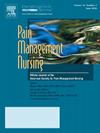Optimizing Perioperative Pain Outcomes in Substance Use Disorder and Chronic Pain
IF 1.6
4区 医学
Q2 NURSING
引用次数: 0
Abstract
PURPOSE
Improve perioperative pain control for patients with substance use disorder (SUD) and/or chronic pain through a advanced practice registered nurse (APRN)-led program that proactively supports this vulnerable population through care coordination & patient education.
Summary
Patients with SUD and/or chronic pain have high prevalence of uncontrolled postop pain. The complexity of medication assisted treatment (MAT)/chronic opioid therapy complicates pharmacologic management of pain during the periop period. This marginalized group often has increased length of stay and decreased patient satisfaction. Evidence-based practice guidelines and professional organization recommendations support pre-admission care coordination with pain expert for patient specific guidance, education and pain regimen planning that includes input from the patient.
Methods
APRN led program identified best practice recommendations to facilitate pre-admission care coordination for patients at risk for uncontrolled postop pain. Through collaboration with Presurgical testing, community surgeons, patient access & public affairs, a Transitional Pain Consultation program provides a preadmission virtual consult with APRN pain expert to provide patient specific guidance in regards to MAT and/or chronic opioid therapy. Recommendations provided to surgeon, anesthesia provider & nursing staff ensures optimal medication regimen. Transitioning patient back to home MAT regimen or community pain provider closes the loop to enhance patient experience.
Results
Prior to implementation, at risk patients experienced unneccary uncontrolled postop pain due to lack of coordination and understanding of the complexities of MAT. Patients with SUD often suspended MAT preop fear of uncontrolled pain & lack of understanding newer guidelines for continuation of MAT in the peri-op window.
Data collected demonstrates the number of consults increasing from 5 per month to 20 per month with collaboration of patient access and public affairs, continuation of MAT peri-op increasing from 0% prior to 80% with pre-op APRN consultation. Patient satisfaction with program demonstrates 90% of patients who compete the consult endorse feeling heard and would recommend this program to other patients.
Future Implications for Nursing
Patient outcomes improve when evidence-based resources are implemented to facilitate patient comfort and support transitions of care for vulnerable patients with SUD and/or chronic pain. Strategies for replication of this best practice model of nurse autonomy will be shared.
求助全文
约1分钟内获得全文
求助全文
来源期刊

Pain Management Nursing
医学-护理
CiteScore
3.00
自引率
5.90%
发文量
187
审稿时长
>12 weeks
期刊介绍:
This peer-reviewed journal offers a unique focus on the realm of pain management as it applies to nursing. Original and review articles from experts in the field offer key insights in the areas of clinical practice, advocacy, education, administration, and research. Additional features include practice guidelines and pharmacology updates.
 求助内容:
求助内容: 应助结果提醒方式:
应助结果提醒方式:


